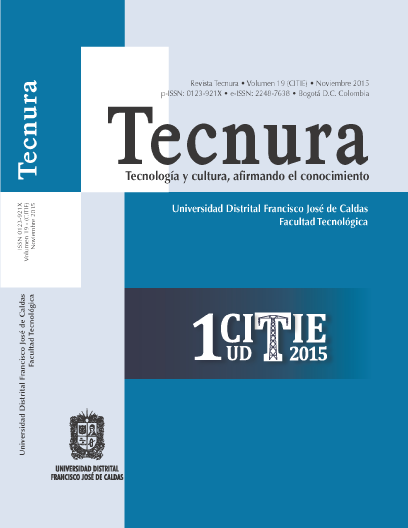DOI:
https://doi.org/10.14483/22487638.9608Published:
2015-11-13Issue:
Vol. 19 (2015): CITIESection:
ResearchSistemas de gestión de baterías (bms) y su importancia para los sistemas de almacenamiento de baterías (bess)
Battery management system (bms) and its importance to battery energy storage system (bess)
Keywords:
sistema de gestión de batería (BMS), sistema de almacenamiento de baterías (BESS), estado de carga (SOC), duración restante de la vida útil (SOH). (es).Keywords:
battery management system (BMS), battery energy storage system (BESS), state of charge (SOC), state of health (SOH). (en).Downloads
Abstract (es)
El incremento en la implementación de sistemas eléctricos alimentados con energías renovables requiere de sistemas de almacenamiento seguro y confiable, por lo tanto mientras no se desarrollen tecnologías para la construcción de baterías es necesario mejorar su uso a través de su parte operativa. Este artículo resume la principales características con las que deben contar hoy en día los BMS en sistemas con baterías para protegerlas y prolongar su vida útil a través de cinco secciones: introducción a los BMS, primeros usos, el sistema de reconfiguración, retroalimentación activa y finalmente el enfoque económico.
Abstract (en)
Increase implementation of electric system feed with renewable energy requires storage systems reliable and secure hence while it does not develop technology in making battery it is necessary improve its use throughout its operative work. This article summaries main features that BMS has nowadays with batteries in order to protect them and extend their lifespan through five approaches: an introduction to BMS, first uses, reconfiguration system, active feedback, and finally, economic approach.
References
Alahmad, M., Hess, H., Mojarradi, M., West, W., & Whitacre, J. (2008). Battery switch array system with application for JPL’s rechargeable micro-scale batteries. Journal of Power Sources, Elsevier, 177(2), 566-578.
Carpinelli, G., Khormali, S., Mottola, F., & Proto, D. (2013). Optimal Operation of Electrical Energy Storage Systems for Industrial Applications. IEEE Power and Energy Society General Meeting (PES). Vancouver, BC.
Chaturvedi, N. A., Klein, R., Christensen, J., Ahmed, J., & Kojic, A. (2010). Algorithms for Advanced Battery-Management Systems. Control Systems, IEEE, 30(3), 49-68.
Ci, S., Zhang, J., Sharif, H., & Alahmad, M. (2012). Dynamic Reconfigurable Multi-Cell Battery: A Novel Approach to Improve Battery Performance. 27th Applied Power Electronics Conference and Exposition, IEEE APEC. Orlando, Florida: IEEE.
Cole, B., Schmitt, R., & Szymborski, J. (1998). Operational Characteristics of VRLA Batteries Configured in Parallel Strings. 20th International Telecommunications Energy Conference, IEEE INTELEC. San Francisco, CA, USA.
Haq, I., Leksono, E., Iqbal, M., Sodami, F., Nugraha, Kurniadi, D., & Yuliarto, B. (2014). Development of battery management system for cell monitoring and protection. International Conference on Electrical Engineering and Computer Science (ICEECS) (págs. 203-208). Kuta, Indonesia: IEEE.
Hernández, J., Campos, A. F., & Gómez, R. (2015). State of charge and state of health determination model for a lead-acid battery to be implemented in a management system. WIT Transactions on Ecology and the Enviroment, 195.
Jin, F., & Shin, K. G. (2012). Pack Sizing and Reconfiguration for Management of Large-Scale Batteries. 3rd International Conference on Cyber-Physical Systems, IEEE ACM. Beijing, China.
Kim, H., & Shin, K. (2009). On Dynamic Reconfiguration of Large-Scale Battery System. 15th IEEE Real-Time and Embedded Technology and Applications Symposium. San Francisco.
Kim, T., Qiao, W., & Qu, L. (2010). Series-Connected Reconfigurable Multicell Battery: A Novel Design Towards Smart Batteries. Energy Conversion Congress and Exposition, IEEE ECCE. Atlanta: IEEE.
Kim, T., Qiao, W., & Qu, L. (2011). Self-Reconfigurable Multicell Batteries. Energy Conversion Congress and Exposition, IEEE ECCE. Phoenix, Arizona: IEEE.
Kim, T., Qiao, W., & Qu, L. (2011). Series-Connected Self-Reconfigurable Multicell Battery. 26th Applied Power Electronics Conference and Exposition, IEEE APEC. Fort Worth, Texas: IEEE.
Kim, T., Qiao, W., & Qu, L. (2012). A Series-Connected Self-Reconfigurable Multicell Battery Capable of Safe and Effective Charging/Discharging and Balancing Operations. 27th Applied Power Electronics Conference and Exposition, IEEE APEC. Orlando, Florida: IEEE.
Maharjan, L., Yamagishi, T., & Akagi, H. (2010). Active-Power Control of Individual Converter Cells for a Battery Energy Storage System Based on a Multilevel Cascade PWM Converter. IEEE Transactions on Power Electronics, 27(3), 1099-1107.
Mandal, S., Bhojwani, P., Mohanty, S., & Mahapatra, R. (2008). IntellBatt: Towards Smarter Battery Design. 45th Design Automation Conference, IEEE ACM. California, USA: IEEE.
McKeon, B. B., Furukawa, J., & Fenstermacher, S. (2014). Advanced Lead–Acid Batteries and the Development of Grid-Scale Energy Storage System.
Meissner, E., & Richter, G. (2003). Battery Monitoring and Electrical Energy Management Precondition for future vehicle electric power systems. Journal of Power Sources, Elsevier, 116(1-2), 79-98.
Micea, M. V., Ungurean, L., Cârstoiu, G. N., & Groza, V. (2011). Online State-of-Health Assessment for Battery Management Systems. IEEE Transactions on Instrumentation and Measurement, 60(6), 1997-2006.
Pascual, C., & Krein, P. T. (1997). Switched Capacitor system for Automatic Series Battery Equalization. Applied Power Electronics Conference and Exposition, IEEE APEC. Atlanta, USA.
Pattipati, B., Sankavaram, C., & Pattipati, K. (2011). System Identification and Estimation Framework for Pivotal Automotive Battery Management System Characteristics. IEEE Transactions on Systems, Man, and Cybernetics, Part C: Applications and Reviews, 869-884.
Rahimi-Eichi, H., Ojha, U., Baronti, F., & Chow, M. -Y. (2013). Battery Management System: An Overview of Its Application in the Smart Grid and Electric Vehicles. Industrial Electronics Magazine, IEEE, 7(2), 4-16.
Sen, C., & Kar, N. (2009). Battery pack modeling for the analysis of battery management system of a hybrid electric vehicle. Vehicle Power and Propulsion Conference (págs. 207-212). Dearborn, Michigan: IEEE.
Sinkaram, C., Rajakumar, K., & Asirvadam, V. (2012). Modeling battery management system using the lithium-ion battery. IEEE International Conference on Control System, Computing and Engineering (ICCSCE), (págs. 50-55). Penang, Malasia.
Sitterly, M., Wang, L. Y., Yin, G. G., & Wang, C. (2011). Enhanced Identification of Battery Models for Real-Time Battery Management. IEEE Transactions on Sustainable Energy, 2(3), 300-308.
Visairo, H., & Kumar, P. (2008). A Reconfigurable Battery Pack for Improving Power Conversion Efficiency in Portable Devices. 7th International Caribbean Conference on Devices, Circuits and Systems, IEEE ICCDCS. Cancun, Mexico.
Wey, C.-L., & Ping-Chang, J. (2013). A unitized charging and discharging smart battery management system. International Conference on Connected Vehicles and Expo (ICCVE) (págs. 903-909). Las Vegas, Nevada: IEEE.
Zhixin, M., Ling, X., Disfani, V., & Lingling, F. (2014). An SOC-Based Battery Management System for Microgrids. IEEE Transactions on Smart Grid, 966-973.
How to Cite
APA
ACM
ACS
ABNT
Chicago
Harvard
IEEE
MLA
Turabian
Vancouver
Download Citation
License
Esta licencia permite a otros remezclar, adaptar y desarrollar su trabajo incluso con fines comerciales, siempre que le den crédito y concedan licencias para sus nuevas creaciones bajo los mismos términos. Esta licencia a menudo se compara con las licencias de software libre y de código abierto “copyleft”. Todos los trabajos nuevos basados en el tuyo tendrán la misma licencia, por lo que cualquier derivado también permitirá el uso comercial. Esta es la licencia utilizada por Wikipedia y se recomienda para materiales que se beneficiarían al incorporar contenido de Wikipedia y proyectos con licencias similares.


